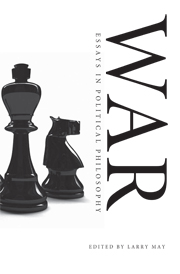Book contents
- Frontmatter
- Contents
- Contributors
- Introduction
- I HISTORICAL BACKGROUND
- II INITIATING WAR
- III WAGING WAR
- 7 Proportionality and Necessity
- 8 Collateral Damage
- 9 Weapons of Mass Destruction: Are They Morally Special?
- 10 Justifying Torture as an Act of War
- 11 On Terrorism: Definition, Defense, and Women
- IV ENDING WAR
- Bibliography
- Index
8 - Collateral Damage
Published online by Cambridge University Press: 05 June 2012
- Frontmatter
- Contents
- Contributors
- Introduction
- I HISTORICAL BACKGROUND
- II INITIATING WAR
- III WAGING WAR
- 7 Proportionality and Necessity
- 8 Collateral Damage
- 9 Weapons of Mass Destruction: Are They Morally Special?
- 10 Justifying Torture as an Act of War
- 11 On Terrorism: Definition, Defense, and Women
- IV ENDING WAR
- Bibliography
- Index
Summary
The phrase “collateral damage” refers to harm done to persons, animals, or things that agents are not morally permitted to target in the conduct of war, as a side effect of attacks on persons, animals, or things that agents are morally permitted to target in the conduct of war. Call the first category – that is, those persons, animals, or things that agents are not morally permitted to target – illegitimate targets of war, and the second category legitimate targets of war. Collateral damage, then, refers to harm done to illegitimate targets of war as a side effect of attacks on legitimate targets of war. As this characterization indicates, a complete response to the question of when, if ever, acts of war that cause collateral damage are morally justifiable must address harm done to private and public property, domestic and wild animals, and the environment. In this essay, however, I will focus solely on harm done to persons who are illegitimate targets of war, as a side effect of attacks on legitimate targets. My reason for doing so is twofold. First, most historical and contemporary discussion focuses on the rightness or wrongness of this particular kind of collateral damage. Second, rightly or wrongly, most people appear to be more concerned with harm done to persons than they are with harm done to animals, the environment, or inanimate objects.
Information
- Type
- Chapter
- Information
- WarEssays in Political Philosophy, pp. 145 - 164Publisher: Cambridge University PressPrint publication year: 2008
Accessibility standard: Unknown
Why this information is here
This section outlines the accessibility features of this content - including support for screen readers, full keyboard navigation and high-contrast display options. This may not be relevant for you.Accessibility Information
- 5
- Cited by
